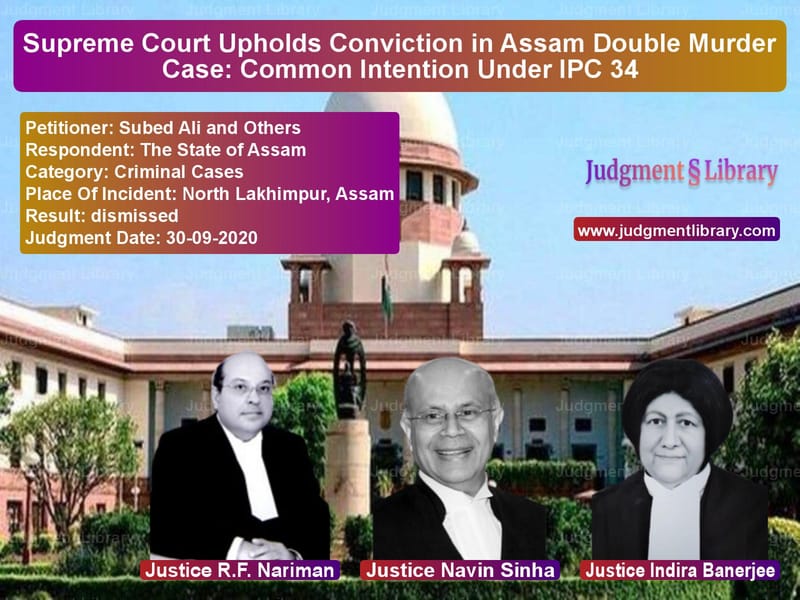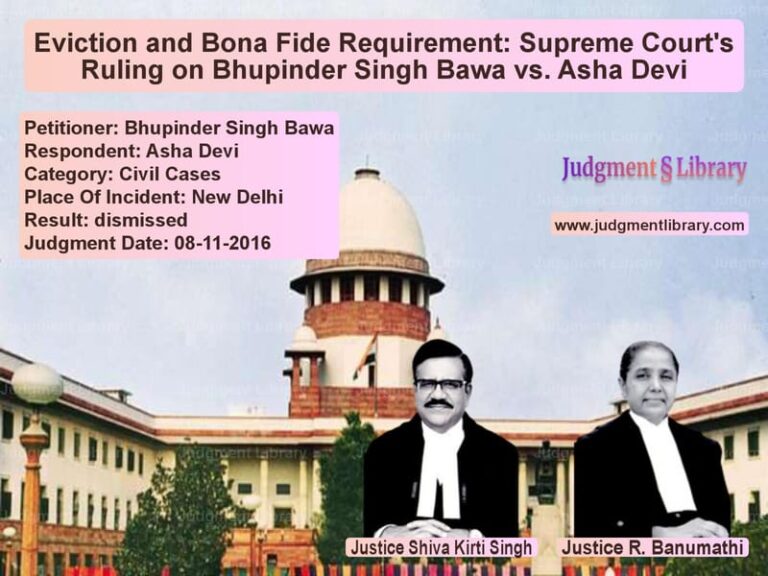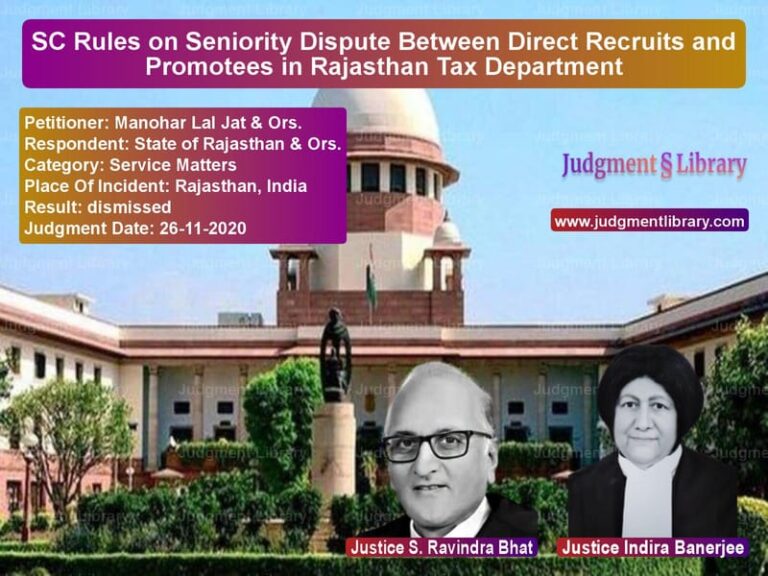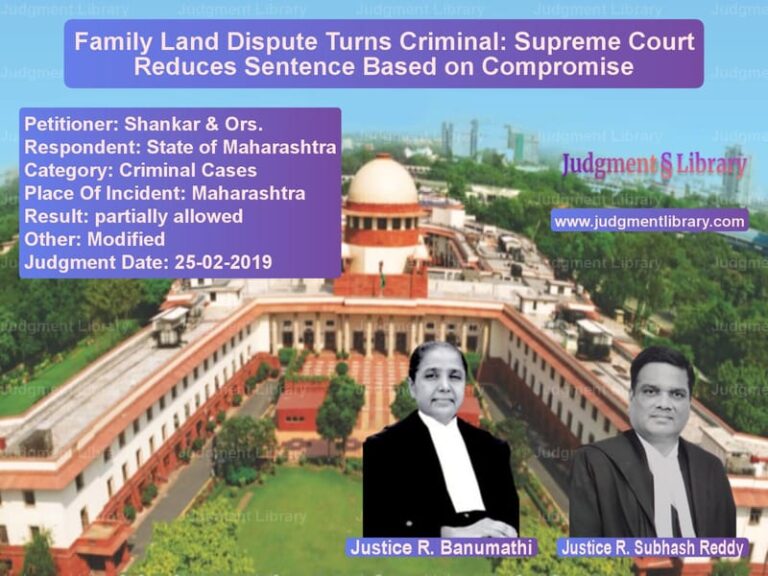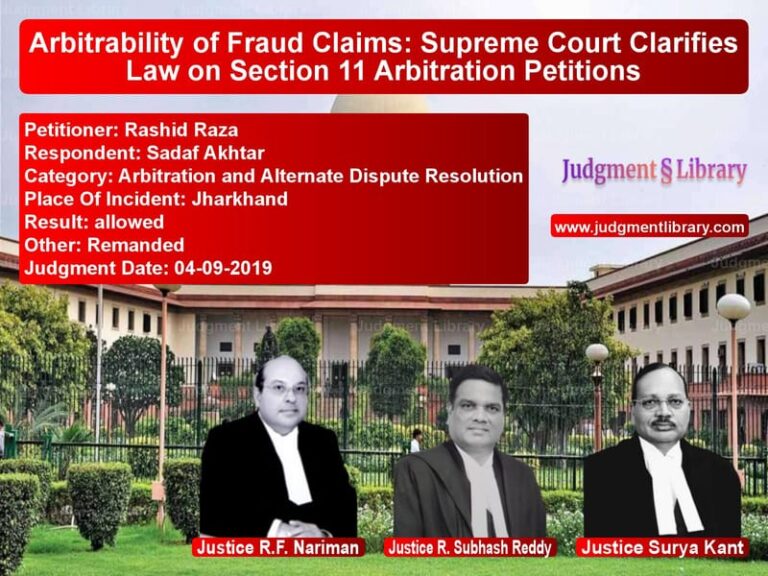Supreme Court Upholds Conviction in Assam Double Murder Case: Common Intention Under IPC 34
The case of Subed Ali and Others vs. The State of Assam revolves around the conviction of the appellants under Section 302/34 of the Indian Penal Code (IPC) for the murder of Abdul Motin and Abdul Barek. The Supreme Court had to determine whether the conviction of the appellants was justified when two co-accused had been acquitted on benefit of doubt. The Court also analyzed the application of common intention under Section 34 IPC.
The Sessions Judge, North Lakhimpur, sentenced the appellants to life imprisonment along with a fine. The High Court upheld the conviction. The appellants challenged the decision before the Supreme Court, which dismissed the appeal and affirmed the lower court’s findings.
Background of the Case
On August 5, 2005, around 6:00 PM, Abdul Motin and Abdul Barek were returning home from the market on bicycles when they were intercepted and assaulted by the accused. Abdul Barek died on the spot, while Abdul Motin succumbed to injuries in the hospital the same night. The case was registered, and five individuals were initially accused. However, two of them were acquitted by the trial court on benefit of doubt.
Petitioner’s Arguments
The counsel for the appellants argued:
- Two co-accused were acquitted on benefit of doubt. Since their conviction was based on the same evidence, the appellants should also be acquitted.
- There were inconsistencies in the testimonies of eyewitnesses (P.Ws. 5, 6, 7, and 9).
- The incident took place after dark, making identification of the accused unreliable.
- Key witnesses who allegedly identified the accused were not examined.
- Only appellants 2 and 3 were said to have attacked the victims, while appellant 1 had no role in the assault and did not possess any weapon.
- No charge was specifically framed under Section 34 IPC (common intention), and thus, conviction under this section was unjustified.
Respondent’s Arguments
The State of Assam contended:
- The presence of the accused at the scene and their roles in the attack were well established by eyewitnesses.
- The acquittal of two accused did not impact the case against the appellants, as the evidence against them was strong and consistent.
- Common intention was evident from the manner in which the accused intercepted the victims and attacked them together.
- The appellants were lying in wait for the victims, and the attack was pre-planned.
Supreme Court’s Key Observations
The Supreme Court reviewed the facts and evidence and made the following key observations:
“The acquittal of the two co-accused in the facts of the case, despite the deposition of the eyewitnesses, can be of no avail to the appellants in view of the consistent nature of the evidence available against them.”
The Court further noted:
- The eyewitnesses provided a consistent account of the attack, making minor contradictions inconsequential.
- There was sufficient light for identification despite the argument that the attack took place after sunset.
- The appellants were lying in wait for the victims, which indicated premeditation.
- The injuries sustained by both victims were brutal, with multiple sharp weapon cuts.
Common Intention Under Section 34 IPC
The Court analyzed the application of Section 34 IPC and referred to key precedents:
“Common intention consists of several persons acting in unison to achieve a common purpose, though their roles may be different. The role may be active or passive; it is irrelevant once common intention is established.”
In support of this principle, the Court cited:
- Karnail Singh vs. State of Punjab (1954 SCR 904): Failure to charge under Section 34 IPC does not result in prejudice if the evidence proves common intention.
- Ramaswami Avyangar vs. State of Tamil Nadu (1976) 3 SCC 779: “The coming together of accused, their roles, and execution of crime indicate common intention.”
- Surender Chauhan vs. State of Madhya Pradesh (2000) 4 SCC 110: “Common intention can develop on the spot and be inferred from facts.”
Final Judgment
The Supreme Court dismissed the appeal, upholding the conviction and sentence:
“We find no reason to interfere with the conviction and sentence of the appellants. The appeal is dismissed.”
Implications of the Judgment
This ruling has significant implications for criminal jurisprudence in India:
- It reinforces the principle that common intention does not require all accused to have the same role.
- Eyewitness testimony remains crucial, even if minor contradictions exist.
- Failure to frame a specific charge under Section 34 IPC does not bar conviction if the evidence establishes common intention.
- The ruling sets a precedent for how courts should assess the evidence when multiple accused are involved.
With this verdict, the Supreme Court reaffirmed its commitment to ensuring that perpetrators of premeditated crimes do not escape punishment due to technicalities.
Petitioner Name: Subed Ali and Others.Respondent Name: The State of Assam.Judgment By: Justice R.F. Nariman, Justice Navin Sinha, Justice Indira Banerjee.Place Of Incident: North Lakhimpur, Assam.Judgment Date: 30-09-2020.
Don’t miss out on the full details! Download the complete judgment in PDF format below and gain valuable insights instantly!
Download Judgment: Subed Ali and Others vs The State of Assam Supreme Court of India Judgment Dated 30-09-2020.pdf
Direct Downlaod Judgment: Direct downlaod this Judgment
See all petitions in Murder Cases
See all petitions in Attempt to Murder Cases
See all petitions in Judgment by Rohinton Fali Nariman
See all petitions in Judgment by Navin Sinha
See all petitions in Judgment by Indira Banerjee
See all petitions in dismissed
See all petitions in supreme court of India judgments September 2020
See all petitions in 2020 judgments
See all posts in Criminal Cases Category
See all allowed petitions in Criminal Cases Category
See all Dismissed petitions in Criminal Cases Category
See all partially allowed petitions in Criminal Cases Category

